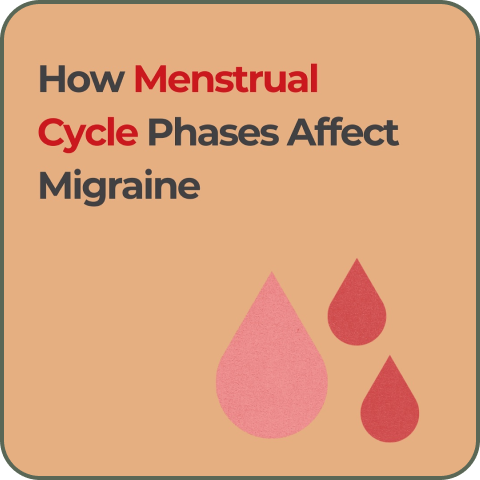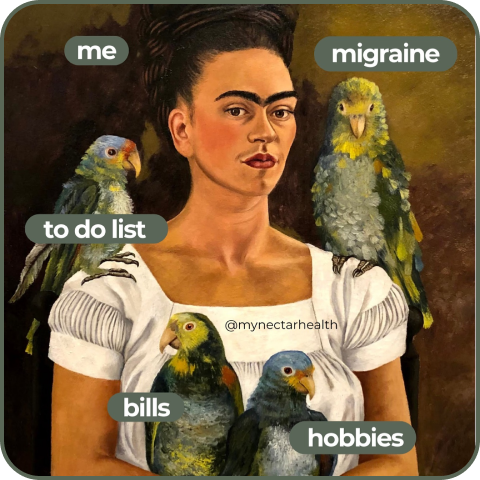Stress often seems like an unavoidable part of modern life. But if you’re dealing with migraines, stress isn’t just “in your head”—it plays a direct and powerful role in triggering attacks. In fact, many people are unaware of how deeply stress can affect brain chemistry, hormone balance, and pain sensitivity.
If you’ve ever experienced a migraine after a tough week or during vacation, you’re not imagining things. Understanding the connection between stress and migraines is key to taking back control of your health. Let’s dive into the hidden ways stress triggers migraines—and more importantly, what you can do about it.
Stress—A Major but Overlooked Migraine Trigger
Stress is often brushed off as a “secondary” trigger, but science shows it has a much more direct role. It’s not just emotional pressure; stress affects inflammation, hormone levels, and brain chemistry, all crucial elements in migraine relief and prevention.
One significant hidden trigger is the let-down migraine. This occurs not during high stress but after it ends—like Alicia, who consistently powered through stressful weeks only to end up with migraines during her weekends or holidays.
Another sneaky factor? Stress sensitizes your brain to other migraine triggers. Even minor irritations can feel overwhelming when chronic stress inflames your nervous system.
✅ Key Takeaway:
Chronic stress isn’t just a trigger—it sets the stage for repeated attacks by making your body more vulnerable.
The Stress-Migraine Cycle—How It Keeps You Stuck
One of the biggest frustrations of caffeine migraine connection and stress-induced migraines is the vicious cycle it creates:
- Stress triggers a migraine.
- Migraine causes missed plans and worry.
- That worry creates more stress.
- The cycle continues.
Breaking the cycle means addressing stress proactively—not just reacting when a migraine hits. Everyday stressors like parenting, work deadlines, or financial worries often can’t be eliminated, but their impact can be managed.
✅ Key Takeaway:
Success lies in consistent, daily stress reduction—not just one-off relaxation days.
How Stress Impacts Your Nervous System (Western View)
From a Western medical standpoint, stress triggers an overactive sympathetic nervous system (“fight or flight” mode).
This makes your body hypersensitive to:
- Light
- Noise
- Changes in routine
If you experienced childhood trauma, this “wiring” is often even stronger and can systematically set the stage for migraines.
The solution? Activating the parasympathetic nervous system (“rest and digest” mode) through:
- Deep diaphragmatic breathing
- Meditation
- Gentle yoga
✅ Key Takeaway:
Training your nervous system to relax can dramatically lower your migraine risk.

Why “Just Relax” Doesn’t Work for Migraines
“Just relax” sounds simple—but for migraine sufferers, it’s often ineffective. That’s because migraine isn’t only about emotions; it’s about physiological reactions to stress.
In fact, sudden relaxation (like starting a vacation after months of overwork) can trigger migraines because of sharp cortisol level drops.
Instead, adopt daily micro-habits:
- Short breaks throughout the day
- Morning breathing exercises
- Progressive muscle relaxation before sleep
✅ Key Takeaway:
Managing stress daily is more effective than reacting to burnout episodes.
Integrating Eastern Wisdom into Stress Management
Eastern practices recognize that stress physically manifests in the body. In Ayurveda, migraines often arise from excess Pitta—the fiery energy aggravated by stress and intense emotions.
Ways to balance Pitta and manage stress migraines:
- Cooling foods like cucumber, coconut, and dairy
- Mindfulness practices like meditation and Yoga Nidra
- Stress-relieving herbs like chamomile and turmeric
✅ Key Takeaway:
Balancing your body’s energy daily can prevent stress-induced migraine flare-ups.
The Role of Sleep, Diet, and Movement in Stress Management
Managing stress isn’t just mental—it’s physical too. Focus on these three pillars:
- Sleep:
Consistent, quality sleep regulates cortisol and reduces migraine sensitivity. Aim for 7–9 hours nightly. - Diet:
Balanced blood sugar keeps stress hormones in check. Include protein, healthy fats, and fiber in meals. - Movement:
Gentle exercise like walking or yoga regulates your nervous system. Avoid overly intense workouts that might trigger attacks.
✅ Key Takeaway:
A consistent lifestyle focused on balance protects your body against stress-triggered migraines.
Creating a Personalized Stress-Reduction Plan for Migraine
Because everyone’s triggers are unique, your plan should be too:
- Track Your Triggers:
Use a diary to spot patterns around stress and migraines. - Identify Top Stressors:
Target 2–3 major stress points in your life. - Daily Habits:
Incorporate stress-reduction micro-habits like short breathing exercises and regular stretch breaks. - Recovery Focus:
Allow time for body and nervous system recovery through massages, nature walks, and gentle acupuncture.
✅ Key Takeaway:
Personalized, daily routines—not occasional “relaxation days”—are the secret weapon against stress migraines.
Conclusion: Stress Is Manageable—And So Are Your Migraines
While stress might always be a part of life, it doesn’t have to control your migraines.
By understanding how stress triggers migraines and practicing small, daily habits to build resilience, you can drastically reduce the frequency and severity of attacks.
Remember: it’s not about avoiding all stress—it’s about changing how your body responds to it.
Start with one habit today and watch your migraines shift over time.
Join the Migraine Heroes Community
💡 New podcast episodes drop every Monday and Wednesday! If you’re a migraine warrior, you’re in the right place.
📲 Download the Migraine Heroes App—the only service worldwide that teaches you how to prevent and stop migraines by adding selective foods to your diet. Start tracking and finally take control of your health!
Disclaimer: This blog is for informational purposes only and does not substitute for providing medical advice. Always consult your healthcare professional before making any health-related decisions.
For women, men, and children who suffer from migraine disease, Migraine Heroes is your go-to resource for understanding, managing, and overcoming migraine attacks.
We cover all types of migraines and related headaches, including primary and secondary migraines, chronic migraines, and cluster migraines. We dive deep into the complexities of migraine with aura and migraine without aura, as well as rarer forms like hemiplegic migraine, retinal migraine, and acephalgic migraine (silent migraine). Our discussions also extend to cervicogenic headaches, ice pick headaches, and pressure headaches, which often mimic migraine or contribute to overall migraine burden.





